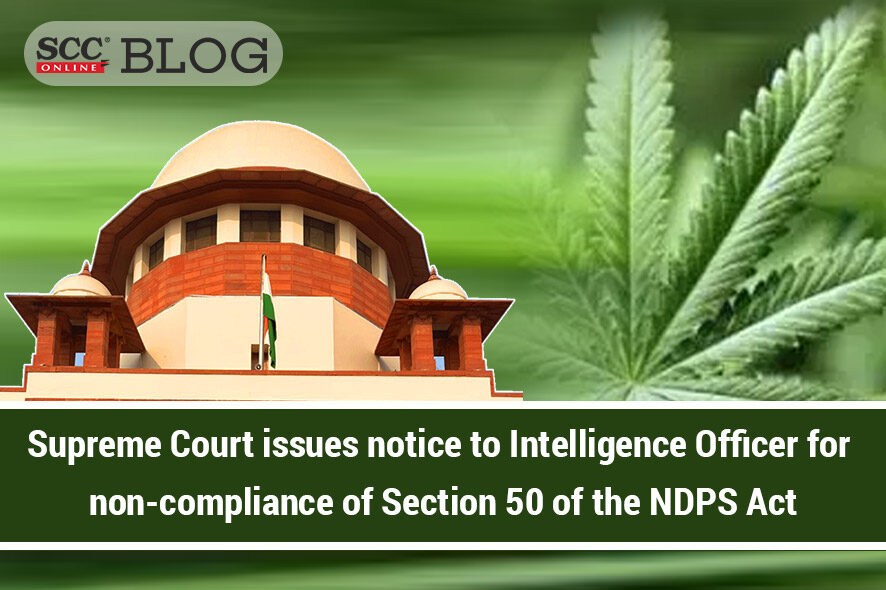Supreme Court: By way of Special Leave Petition, the petitioner had challenged the order passed by the Madras High Court which had partly allowed the appeal preferred by the petitioner and had upheld the judgment of conviction against the petitioner for the offence punishable under Section 8(c), Section 21(c), Section 25, Section 29 of the Narcotics Drugs and Psychotropic Substances Act, 1985 (‘NDPS’) and sentenced him to rigorous imprisonment for a period of 10 years. As per the custody certificate, the petitioner has already undergone a period of 8 years and 10 months of actual conviction. The division Bench of Abhay S. Oka and Ahsanuddin Amanullah J.J., issued notice to the State by the Intelligence Officer.
Issue for consideration before the Court is with regard to the compliance and applicability of Section 50 of NDPS.
The petitioner relied upon S.K. Raju v. State of West Bengal, (2018) 9 SCC 708 which had observed that wherever the search of a person takes place, the requirement of mandatory compliance of Section 50 of NDPS was attracted, irrespective of whether the contraband was recovered from the body of the person or not.
50. Conditions under which search of persons shall be conducted.—(1) When any officer duly authorised under Section 42 is about to search any person under the provisions of Section 41, Section 42 or Section 43, he shall, if such person so requires, take such person without unnecessary delay to the nearest gazetted officer of any of the departments mentioned in Section 42 or to the nearest Magistrate.
(2) If such requisition is made, the officer may detain the person until he can bring him before the gazetted officer, or the Magistrate referred to in sub-section (1).
(3) The gazetted officer or the Magistrate before whom any such person is brought shall, if he sees no reasonable ground for search, forthwith discharge the person but otherwise shall direct that search be made.
(4) No female shall be searched by anyone excepting a female.
(5) When an officer duly authorised under Section 42 has reason to believe that it is not possible to take the person to be searched to the nearest Gazetted Officer or Magistrate without the possibility of the person to be searched parting with possession of any narcotic drug or psychotropic substance, or controlled substance or article or document, he may, instead of taking such person to the nearest Gazetted Officer or Magistrate, proceed to search the person as provided under Section 100 of the Code of Criminal Procedure, 1973.
(6) After a search is conducted under sub-section (5), the officer shall record the reasons for such belief which necessitated such search and within seventy-two hours send a copy thereof to his immediate official superior.
The petitioner contended that the impugned judgment was bad in law as the same ignored the mandatory provision of Section 50 of NDPS. It was contended that the prosecution had failed to prove the case beyond reasonable doubt since the story of the prosecution was filled with numerous contradictions. It’s an established fact that the alleged seizure of the contraband becomes vitiated if the provision of Section 50 of NDPS was not complied with.
The petitioner submitted that as per the cross examinations of prosecution witness 5, admittedly the accused was not explained their right to be searched individually, hence the judgement of conviction could not have been sustained. The Courts below based their findings upon the consideration that since the contraband was not seized from the body of the petitioner, therefore the rigor of Section 50 of the NDPS Act would not be applicable which is in contrary to the judgement in SK Raju (Supra).
After perusing the above stated facts, the Bench issued notice to the State by the Intelligence Officer. The matter was adjourned for a hearing on 01-05-2023.
[Mohammed Imran Mansoori v. State by the Intelligence Officer, 2023 SCC OnLine SC 372, decided on 27-03-2023]
Advocates who appeared in this case:
For the Petitioner- Advocate Tushar Arora, Advocate Haider Mujeeb, Advocate Anubhav Sharma, Advocate on Record Mohit D. Ram.







